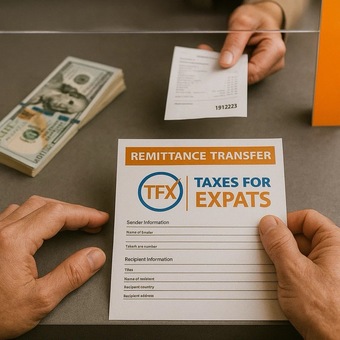Filing taxes for the deceased (A guide for the recently departed)

Death and taxes are two of life's certainties. But what happens when those two things collide?
The process that factually is not as grim as it sounds. In fact, with a little bit of planning and organization, filing taxes for the deceased can be a straightforward process.
So, step by step.
But first -
Understanding the tax return: A “prephase”
There are two types of tax returns that may need to be filed for a deceased individual:
- a final tax return and
- a regular tax return.
A final tax return is filed for the year in which the individual passed away, and covers the period from January 1st of that year until the date of death.
This tax return will include all income received by the deceased up until the date of death, as well as any deductions and credits that apply.
A regular tax return may need to be filed if the deceased's income exceeded certain thresholds in previous tax years.
In this case, the tax return will cover the entire year and will include all income received by the deceased during that time.
1. Determining if a final tax return is required
The first step in filing taxes for the deceased process is determining if a final tax return is required.
A final tax return is required for the year of death if the deceased person received income during that year that was not reported on a previous tax return.
This includes income from sources such as wages, self-employment, pensions, and investments.
If the deceased person was married, the surviving spouse may be able to file a joint return for the year of death.
NOTE! This can often result in a lower tax liability than filing separately.
2. Determining responsibility
The next step is determining who is responsible for the task.
If the deceased had a will, the executor of the estate is responsible for filing the taxes. If there is no will, the court will appoint an administrator to handle the deceased's affairs, including filing taxes.
If you're not sure who is responsible for filing the taxes, don't hesitate to seek guidance from a tax professional or attorney.
NB! It's crucial to ensure that the right person takes on this responsibility, as failing to file taxes can result in legal issues and penalties.
3. Obtaining the necessary info
Once it's determined that a final tax return is required, the next step is to gather the necessary information. This includes:
- The deceased person's Social Security number;
- Records of income received during the year of death;
- Records of any deductions or credits that may apply;
- Any relevant tax forms, such as W-2s or 1099s.
Also read - Form 1099-MISC: A comprehensive guide
If the deceased kept good records, this information may be readily available. If not, it may be necessary to contact employers, financial institutions, or other sources to obtain the necessary information.
4. Filing the final tax return
Once all the necessary information has been gathered, it's time to file the final tax return. This can be done using Form 1040, the same form used for regular tax returns.
The final tax return should be marked as "final" at the top of the form, and should be signed by the deceased person's personal representative, such as an executor or administrator.
If the deceased owed taxes, the personal representative should pay the tax liability from the deceased person's assets.
NOTE! If the deceased person is owed a refund, the personal representative may be able to claim the refund on the final tax return.
5. Estate tax returns
In addition to the final income tax return, it may be necessary to file an estate tax return if the deceased person's estate is valued above a certain threshold.
The estate tax return is filed using IRS Form 706, and is due nine months after the date of death. This tax return is used to calculate and pay any estate taxes owed by the deceased person's estate.
The estate tax is based on the value of the estate at the time of death, and can be a significant expense for larger estates.
6. Seeking pro assistance
Filing taxes for the deceased can be a complex process, especially if there are multiple sources of income or a large estate to consider. So, it's often a good idea to seek professional help from a tax expert or accountant.
A tax pro can help ensure that all the necessary forms are filed correctly and on time, and can provide guidance on tax planning strategies that can minimize tax liabilities for the deceased person's estate and beneficiaries.
Never had a pro tax help before?
Check out how it works
Bonus: Deductions and credits
When preparing the tax return, it's important to be aware of any deductions and credits that may be available to reduce the tax liability.
For example, medical expenses related to the deceased's final illness may be deductible, as well as any charitable contributions made on behalf of the deceased.
NB! In addition, it's important to consider any potential tax credits, such as the Earned Income Tax Credit or the Child Tax Credit, which can help reduce the overall tax liability.
To Sum Up
As you can see, filing taxes for the deceased is not as daunting as it may seem. With the right information, organization, and expert assistance, you can ensure that the deceased person's tax affairs are handled in a responsible and timely manner.
FAQ
Failing to file taxes for a deceased individual can lead to penalties and potential legal action from the IRS, especially if taxes were owed. It can also delay the estate settlement and distribution of assets to heirs.
Yes, a final tax return is required for a deceased person if they earned or owned assets that generated income during the tax year. This task is typically handled by the estate's executor or personal representative, covering income from the start of the tax year to the date of death.
Yes, you can file taxes electronically for a deceased person. Your CPA can help you prepare all the necessary information and file it electronically.
If filing on paper, you should write “Deceased,” the taxpayer's name, and the date of death across the top of the final return.
The tax refund of a deceased person is typically issued to the estate's executor or personal representative. In the absence of an executor, the refund may go to the surviving spouse or next of kin, to be distributed according to the will or state law.



